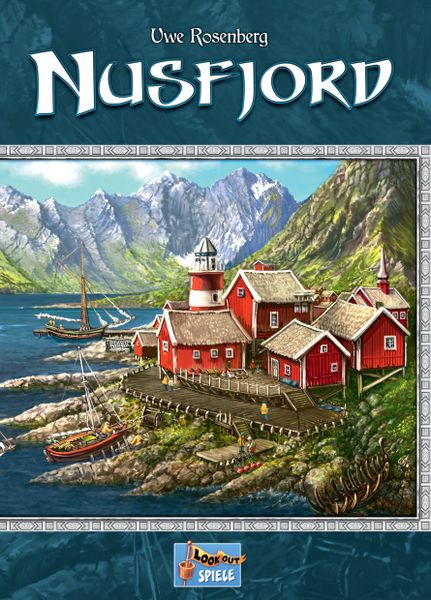Nusfjord (2017) Board Game
Nusfjord is a board game released in 2017, designed by Uwe Rosenberg and published by Lookout Games. The game is set in the fishing village of Nusfjord in Norway, where players take on the role of fishing magnates competing to build the most prosperous fishing business.
Game Components of Nusfjord
How To Setup Nusfjord
To set up Nusfjord, each player begins with a personal harbor board, a supply board, three worker tokens, and five shares in their fishing company. The central action board is placed in the middle of the table, along with four common boards shared by all players. The game starts with a random distribution of tiles that trigger the addition of new buildings at specific points during the game. Players determine their starting player randomly, and each round is divided into three phases: the fishing phase, where players determine their fish catch based on their boats; the distribution phase, where fish are allocated to elders, shares, and the player’s reserve; and the work phase, where players take three actions each, placing their worker tokens on the action board to perform various tasks such as clearing forests, buying new ships, or constructing buildings.
Gameplay Mechanics and Game Objective
Mechanics:
Game Objective:
Player Experience
Playing Nusfjord is a complex and engaging experience that requires strategic planning and resource optimization. The game involves a delicate balance between feeding elders, expanding the fleet, and constructing buildings, all while managing scarce resources. The worker placement mechanism adds a layer of competition and timing, as players must strategically place their workers to secure the actions they need. The game’s design encourages efficiency and long-term planning, making it appealing to players who enjoy intricate strategies and resource management.
Pros
Cons
Personal Thoughts on Nusfjord
Nusfjord is ideal for experienced board game enthusiasts who appreciate complex strategies and resource management. It is particularly suited for fans of Uwe Rosenberg’s other games, such as Agricola and A Feast for Odin, as it shares similar mechanics and depth. However, due to its cognitive demands, it may not be the best fit for players with fluid intelligence impairments or those seeking a more casual gaming experience. Despite this, the game’s modular design and thematic coherence make it a compelling addition to any serious board game collection.
We are supported by our audience. When you purchase through links on our site, we may earn an affiliate commission, at no extra cost for you. Learn more.

